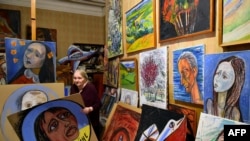Yelena Osipova barely slept ahead of Russia's pomp-filled Victory Day celebrations on May 9.
The 76-year-old artist was up late, making placards to protest about the conflict in Ukraine.
But the moment she stepped out of her home in St. Petersburg on her way to demonstrate, two unknown men snatched the work from her and ran off.
"It was upsetting. I'd worked half the night and really liked those placards," the white-haired painter told AFP.
"It's obvious that it was an organized attack."
Indefatigable as ever, within an hour, the tiny, stooped woman, who moves with difficulty, already had a new poster and was heading out again to protest.
Osipova is well-known in her hometown.
She has been called the "conscience of St. Petersburg," Russia's second city, after two decades spent publicly opposing the rule of President Vladimir Putin.
Since the Kremlin's forces rolled into Ukraine, she has also become a symbol of Russians standing up against the conflict.
Footage of her frequent detentions by riot police has been widely circulated on social media.
"The main thing is that people should say these forbidden words today: 'No to war,'" said the former art professor.
But in Russia that is a risky prospect.
Protests have been ruthlessly stamped out and those criticizing the campaign -- a "special military operation" in official parlance -- risk a 15-year jail term.
'Silence means agreement'
Osipova first started taking to the streets two years after former KGB agent Putin took power in 2000.
She has been demonstrating ever since against what she says are the crimes committed by the Russian authorities.
She protested in 2014 when Moscow seized the Crimean peninsula from Ukraine and against the fighting sparked in the east of the country.
Now she is focused on Putin's full-fledged offensive against Russia's pro-Western neighbor.
"If people accept all this, then it means they are not thinking about their children," she said as she showed AFP her work in her flat.
"I'm dedicating my placards to this idea: what world are we leaving to our children?"
She shows off one poster with the face of a young girl shouting "No to war" on a yellow and blue background, the colors of the Ukrainian flag.
Another of a child has the slogan "What world are we leaving behind us?"
"Since 2002 I haven't been able to stay silent, because silence means agreement with what is happening in my country," she said.
"That's why I go to protest."
Her flat with its decrepit vaulted ceilings is in the heart of Russia's former imperial capital and has been home to her family for three generations.
Its two rooms are cluttered with pictures and posters with pacifist and anti-Kremlin messages.
"I don't want to serve as cannon fodder," reads one poster of a soldier. "Wives and mothers, stop the war," says another.
A third proclaims: "We are all hostages of the provocative politics of imperial power."
On one wall hangs a large photo of a young man: her only son, Ivan, who died of tuberculosis in 2009 at 28.
Osipova has been frequently detained by the police, but they now know her so well that they sometimes just take her straight home rather than to the station.
"I've long ago stopped being scared for myself," she said defiantly.
"In your own homeland you should not be afraid, but if you love it you should feel that you are the one in charge."




